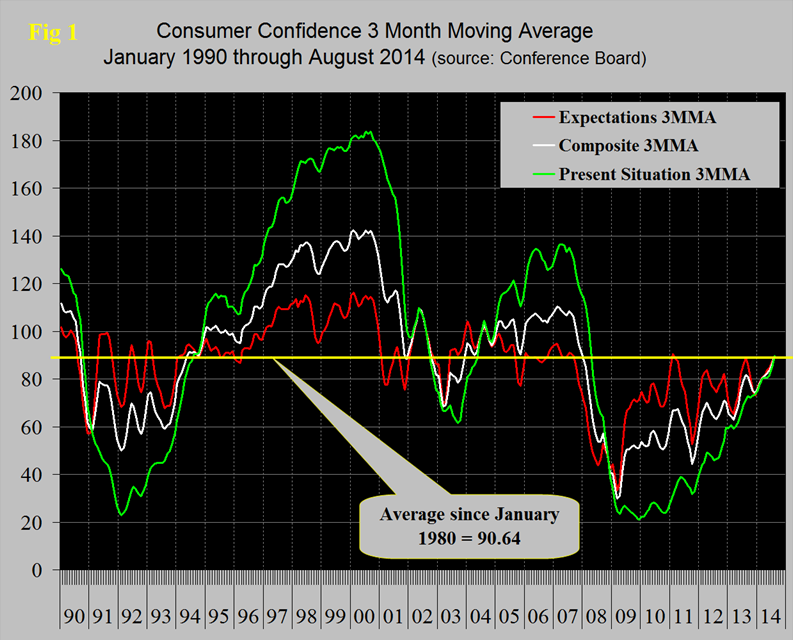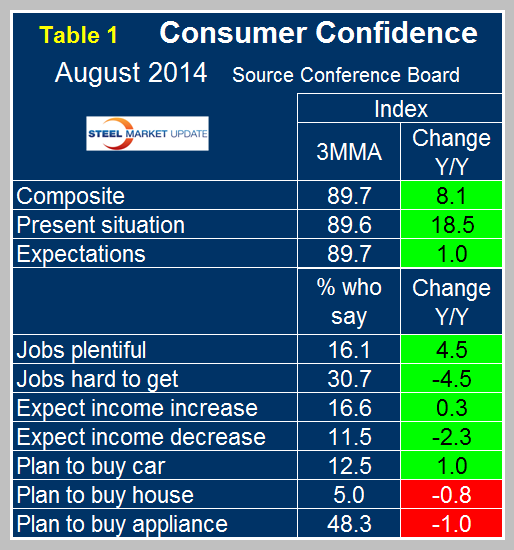Market Data

August 28, 2014
Consumer Confidence in August 2014
Written by Peter Wright
The Consumer Confidence Index as reported by the Conference Board increased by 2.1 in August to 92.4. The view of the Present Situation rose by 6.7 to 94.6 as Expectations declined by 1.0 to 90. These two components have now crossed, as they always do at this stage of a recovery, and the view of the Present Situation has taken the lead. The single data point for the Composite in July, at 92.4, is now higher than the monthly average since January 1980 which is 90.64. That is not the case with the three month moving average (3MMA) which rose by 1.4 to 89.7, (Figure 1). Note that Figure 1 only goes back to 1990.
On a year over year basis using a 3MMA the Composite is up by 8.1 lead by consumers view of the Present Situation which is up by 18.5, (Table 1). The employment sub-indexes, job availability and wage expectations, are improving. Intentions to buy both a house and an appliance became negative in May and continued to be negative in June, July and August, year over year. May was the first time in over a year that housing had been negative, intentions regarding appliances tend to be more erratic.
The official statement from the Conference Board read as follows:
The Conference Board Consumer Confidence Index Improves Again
The Conference Board Consumer Confidence Index, which had increased in July, improved further in August. The Index now stands at 92.4 (1985=100), up from 90.3 in July. The Present Situation Index increased to 94.6 from 87.9, while the Expectations Index edged down to 90.9 from 91.9 in July.
The monthly Consumer Confidence Survey, based on a probability-design random sample, is conducted for The Conference Board by Nielsen, a leading global provider of information and analytics around what consumers buy and watch. The cutoff date for the preliminary results was August 14.
Says Lynn Franco, Director of Economic Indicators at The Conference Board: “Consumer confidence increased for the fourth consecutive month as improving business conditions and robust job growth helped boost consumers’ spirits. Looking ahead, consumers were marginally less optimistic about the short-term outlook compared to July, primarily due to concerns about their earnings. Overall, however, they remain quite positive about the short-term outlooks for the economy and labor market.”
Consumers’ appraisal of current conditions continued to improve through August. Those saying business conditions are “good” edged up to 23.9 percent from 23.3 percent, while those claiming business conditions are “bad” declined to 21.5 percent from 22.8 percent. Consumers’ assessment of the job market was also more positive. Those stating jobs are “plentiful” increased to 18.2 percent from 15.6 percent, while those claiming jobs are “hard to get” declined marginally to 30.6 percent from 30.9 percent.
Consumers were slightly less optimistic in August about the short-term outlook. The percentage of consumers expecting business conditions to improve over the next six months held steady at 20.4 percent, while those expecting business conditions to worsen fell to 10.2 percent from 12.1 percent. Consumers, however, were somewhat mixed about the outlook for the labor market. Those anticipating more jobs in the months ahead fell to 17.0 percent from 18.7 percent, although those anticipating fewer jobs also declined to 15.8 percent from 16.6 percent. Fewer consumers expect their incomes to grow, 15.5 percent in August versus 17.7 percent in July, while those expecting a drop in their incomes rose marginally to 11.9 percent from 11.1 percent. (Source: The Conference Board)









